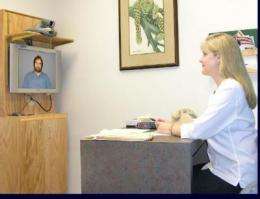Medical interpreters break language barriers in health care

Language barriers in health care settings can decrease access to quality care and diminish comprehension for limited English proficient patients (LEP). These barriers compromise quality of care, and increase costs and inefficiencies. Now, the University of Missouri Institute of Public Policy, Center for Health Policy and Missouri Telehealth Network are partnering with the Language Access Metro Project (LAMP) and the Missouri Primary Care Association to provide medical interpreters to non-English-speaking patients who otherwise might not have access to live interpreters.
"The program will demonstrate the advantages of utilizing professionally trained medical interpreters for LEP patients, including improving patient communication by eliminating language and cultural barriers," said Dana Hughes, policy analyst in the Truman School of Public Affairs. "Interpreters also help health care providers decrease costs and eliminate misdiagnoses and unnecessary testing."
The Missouri Telehealth Interpretation Project will provide LAMP interpreters, free of charge for two years, to health care providers through the Missouri Telehealth Network (MTN), already in place throughout the state. MTN uses two-way live, interactive video to deliver patient care from providers in urban areas to underserved patients throughout the state in specialties such as dermatology, psychiatry, autism, endocrinology and others. LAMP interpreters will attend patient appointments and confirm appointments to reduce patient no-shows and late cancellations.
"By having access to interpreters, health care providers will be able to give linguistically and culturally competent care to their LEP patients," said Nikki Lopresti, director of LAMP. "As word spreads, more LEP patients will gain access to improved quality health care."
Resources for professionally trained medical interpreters in Missouri are limited, especially in rural areas. Availability, scheduling, and quality of interpreters are issues for many primary care clinics.
The project is funded by a grant from the Missouri Foundation for Health. After the initial two-year, grant-funded period ends, continued use of medically trained interpreters will benefit LEP patients, sustain the telehealth network and increase utilization of LAMP interpreters.
Source: University of Missouri-Columbia (news : web)















